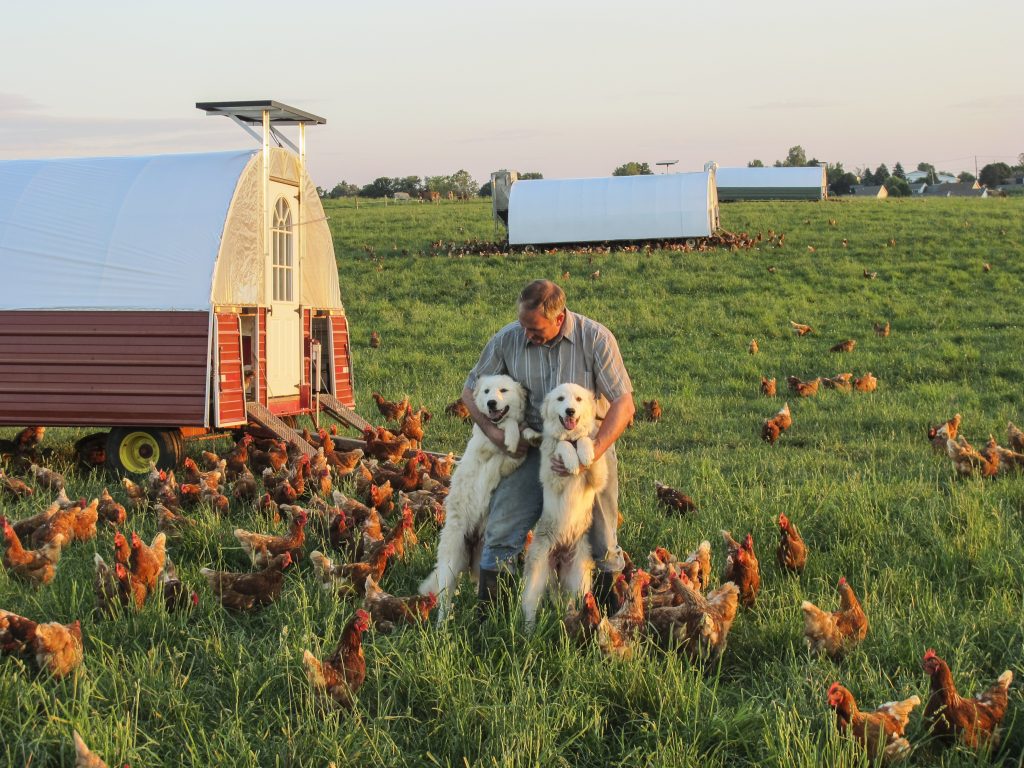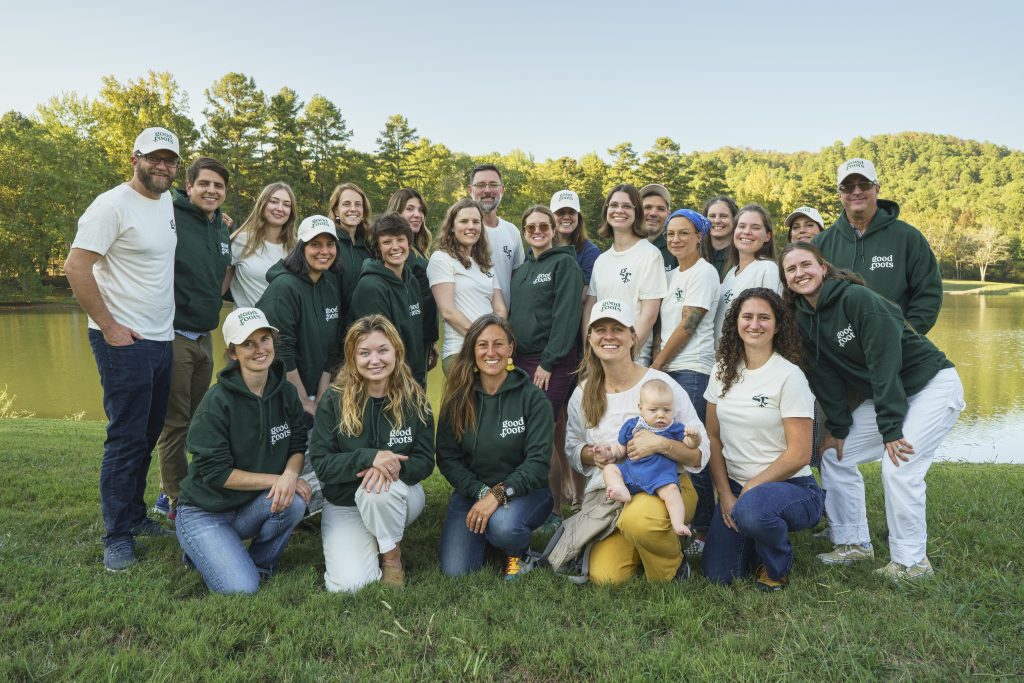Agriculture and food systems are central to humankind – influencing many of the things most critical to human well-being, including health and nutrition, the environment, climate, and community health. Farmers sit at the foundation of all of this and so their ability to be successful is of the utmost importance. However, farmers and the food businesses around them are not always supported at a level that reflects their critical importance. Data from the latest Census of Agriculture – which is released by the USDA every five years – shows that the number of farms in the U.S. is on the decline and that smaller farms are falling behind. Between 2017 and 2022, the total number of farms fell from 2 million to 1.9 million. During that same period, the absolute number of farms fell at every size category (by acres), and the number of farms with sales less than $500,000 also fell, but those farms with $500,000 or more in farms sales were the only group to grow during that time period. While farmers of all kinds and sizes face the unique risks of farming, including weather, climate, and markets – smaller farmers face the added challenge presented by their size in a system that values and supports scale. The future of these small farmers and the small businesses around them relies, in part, on the system of support they can access that enables them to thrive in today’s agriculture and food ecosystem. Fortunately, two experienced farm and food business service providers have combined forces to address this critical need.
The Business of Farming
Farming is a challenging, capital-intensive business with slim operating margins and tremendous risk due to increasingly unpredictable weather and market conditions. For small and medium-sized farmers, balancing production work with the complexities of running a business is crucial for survival. But to be successful one must grow or build a good product (whether that be crops, services or something else) and be a good business operator, marketer, and sales representative. Balance on top of this, the fact that many of these smaller farmers and business operators must also balance work outside of their food and farm businesses. For example, 96% of farm households in the US rely on income from off-farm work. USDA ERS data from 2019 shows that 82% of farm household income comes from off-farm, and the number is even higher for small farms. Clearly, while farmers may be driven by their passion for producing good food, they are often spread thin – managing finances, operations, and marketing can often take a backseat to revenue-generating work and crop production.

Pennsylvania based food business, The Family Cow. Source: Good Roots & The Family Cow
“The primary challenge we see in the food and farming space is the gap between passionate farmers and food entrepreneurs and their ability to sustain and scale their businesses,” says Co-CEO Ted LeBow of Good Roots, a company specializing in business and marketing services for small farms and organizations. “Many of these individuals are experts in growing and producing high-quality food but may lack the business acumen or resources to navigate the complexities of financial management, marketing, and operational efficiency.”
An emerging gap in the farming and food industry lies in the lack of resources to help farmers with business and marketing—areas that are not their primary expertise but are crucial for success. As these needs grow more complex, Good Roots steps in to fill this vital gap, providing the support that farmers need to thrive and to reach their full potential.
How Good Roots Lets Farmers Farm
While Good Roots just recently launched, the company’s roots in the sector run deep. Good Roots emerged from a decades-long partnership between Kitchen Table Consultants’ (KTC) co-founder Ted LeBow, who began KTC in 2009, and Noah Munro, founder of Taste Profit Marketing. As a combined entity, Good Roots offers a unified platform providing accounting, business consulting, and marketing services to farms, ranchers, and food businesses. Their clients are often facing crucial growth inflection points and are typically mission-driven with a strong focus on sustainability, local food systems, and community impact. These range from family farms transitioning to the next generation, to artisanal food producers expanding market reach, and nonprofits working to enhance their communities. Good Roots’ team consists of professionals with diverse backgrounds in business and the food system, allowing them to provide tailored, industry-specific advice.
For Ted and Noah, serving and collaborating with these clients—the individuals who make up the backbone of the food system and rural economies—is integral to their mission of building a healthy, sustainable food system for all.
“What sets us apart is our deep understanding of the food and farming space combined with our commitment to personalized service,” explains Co-CEO Noah Munro. “We understand the unique challenges our clients face because most of us have been in their shoes.”
Good Roots enables farmers and operators to focus on what they love by managing backend needs essential for growth. They provide services such as acting as fractional CFO, creating strategic plans, managing bookkeeping, and building brand awareness, all while empowering clients as business owners. By equipping them with the tools and knowledge to eventually manage these areas independently, Good Roots considers it a success when clients no longer need their services.

The Good Roots Team. Source: Good Roots
What the Gap Means for Regenerative Operations
The challenges of farming and running a business are compounded by the rising risks and costs driven by climate change. Climate-induced weather extremes and shifting temperature patterns have led to higher production and labor costs, uncertain crop yields, and additional time spent by farmers solving these increasingly pronounced issues.
Regenerative agriculture is gaining attention for its ability to support climate resilience, reduce emissions, promote biodiversity, and contribute to sustainable and equitable food systems. While transitioning to regenerative practices can offer long-term ecological and economic benefits, it also reshapes the needs of an entire operational system. For example, adopting regenerative methods can significantly impact a farm’s financial situation. Initial investments in new crops or practices may be high, with margins low at first. There may also be a need to find new markets for new crops or to position crops differently after a transition.
Good Roots can support many of the steps along the way to build a smoother transition both in the field and in the office. With years of experience working with sustainable and regenerative operations, they are a natural fit to support transitioning entities through to the next level of their business.
Delivering Results – Micro Case Studies
From Precarity to $1M in Annual Sales: The Compelling Case of Vermont Wagyu
Dr. Sheila Patinkin is the owner of Spring-Rock Farm and producer of Vermont Wagyu, a top breeder of DNA parent-certified 100% full-blood Wagyu beef. Straddling accounting management, business strategy, and marketing responsibilities in addition to her on-farm work was near impossible.
Although Vermont Wagyu delivers some of the best beef in the world, business stagnated and Dr. Patinkin needed support in expanding beyond the existing wholesale strategy to include direct-to-consumer sales. However, without clear financial metrics and a business plan, Dr. Patinkin struggled to forecast the farm’s performance and build a plan for improvement. Poor operational processes, limited understanding of the brand’s audience, and a lack of marketing and communications tools further fueled business and financial distress.
Dr. Patinkin enlisted Good Roots to help restabilize and grow the brand. Good Roots helped Dr. Patinkin uncover and evaluate her sales margins, goals, COGS (cost of goods sold) in order to ultimately build financial viability. The team also revamped Vermont Wagyu’s e-commerce website to reflect consumer trends, average purchase price, and buying methods. Setting a competitive pricing structure, brand messaging, product marketing, and defining a cold shipping strategy also helped the company reorient itself in a competitive market.
Today, Vermont Wagyu has sold more than $1 million of online beef orders, with an average order value of $250. Through collaboration with Good Roots, the company’s repeat order rate also increased from 25% to 33%, and its email list initially grew from 200 to over 3,500 contacts. Today, they have over 15,000 email subscribers.
Painterland Sisters: Getting a Dream Off the Ground
Hayley and Stephanie Painter, co-founders of Painterland Sisters, approached Good Roots in the early stages of their business with a clear goal: to sustain their family’s dairy farm for future generations. They had numerous ideas—cheese, beef, yogurt, online sales—but weren’t sure where to start. Good Roots helped them find clarity, guiding them through critical decisions that shaped their business into a national organic Skyr yogurt brand.
“Our goal is to build strong, recognizable brands with a clear and compelling message,” says Kristel Keys Running, Director of Marketing Services.
With Good Roots’ support, the sisters chose yogurt as their flagship product and partnered with a co-packer to focus on branding and market presence. Good Roots helped develop a detailed business plan, financial models, and marketing strategies, providing the Painter sisters with the foundation they needed to secure funding and launch their brand. They also brought in a Fractional VP of Sales to strengthen their operations, and later helped the sisters raise $1.2 million through a successful crowdfunding campaign.
As the business grew, Good Roots provided ongoing support, helping the Painter sisters develop their target market, messaging, and brand guidelines. They strategized marketing channels, coached the sisters on building internal marketing and sales systems, and provided hands-on content creation and management for web, social media, email, and digital ads.
Today, Painterland Sisters is a thriving national brand, with its organic Skyr yogurt available in over 3,000 stores across all 50 states. Through its partnership with Good Roots, Painterland Sisters built a solid foundation for continued growth, with projections reaching $12M in revenue and ambitions to grow even further.
The Bigger Picture
The stories of Vermont Wagyu and Painterland Sisters are just two examples of the repeated success Good Roots has helped mission-driven farmers and business owners realize. They highlight the vast potential for both farm and business operators when they have access to business support services, which in turn can drive beneficial outcomes for the broader food system.
The shift to regenerative agriculture and food systems hinges on the success of the businesses that are building that transition. However, for these operations to thrive, they require robust business and marketing resources to remain financially viable and reach the market. Many lack the internal capacity to manage these needs, making supportive partners like Good Roots critical for their success.
By integrating financial management, business strategy, and marketing services, Good Roots helps make these essential resources more accessible. This allows food producers to focus on what they do best—providing sustainable, delicious food for a healthier future.
“The three primary services we offer—marketing, finance, and management—work together to create net profit, the fuel that gives entrepreneurs massive flexibility,” says Co-CEO Ted LeBow. “We don’t work in silos; we’re a collaborative team. When all these services drive a healthy organization, it leads to a healthy profit, enabling regenerative farms to build a sustainable future for our earth.”
To learn more about Good Roots and how they serve the space visit their website here.
